This was it. My last stop for urbanity before I went into the British Columbian wild. I always dubbed this trip as an Alaskan adventure, but in actuality the largest portion of miles would be Canadian. Indeed, British Columbia alone proved to be expansive, rich in history, and absolutely packed with jaw-dropping natural beauty.
I took BC-99 out of Vancouver, also known as the Sea to Sky highway. Upon leaving the city, the road immediately dialed up the majestic. Slate blue mountains erupted from the glittering water, frosted at the tips with blinding white snow. Traffic died down to reveal a serpentine stretch of smooth, beautiful tarmac hugging the rocky curves – almost all to myself. The craggy northwestern island formations I'd been sailing past on ferries, I now found myself flying through on my bike. It was utterly sublime.
The skies were finally clear, but the cold pushed me into a Canadian Tire to warm up. Actually, it was also to find a specific hat, as a gift. I explained to an employee that I heard they carried a hat that made your head look like the Canadian Tire logo, red knit with a green pom.
"Oh, like a toque?"
I must admit, I privately delighted at catching a wild 'toque' in its natural habitat.
"We changed those out for spring. I might be able to dig up one or two in the back though."
He didn't end up finding any, but I felt I already got more than what I was looking for. I'll come back in the fall.
Scooterist Neil had reached out from Whistler, a town where my teenage self attempted to be cool and learn to snowboard (I'm terrible at it, and never went back). As I pulled into the resort town, I had my first close encounter with a Canadian bear, chilling by the train tracks on Alta Lake Road. It looked up as I passed within charging distance, and I swear it asked for a smoke.
The daylight was getting noticeably longer, so I had plenty of time to meet Neil, Janet, and the most likable dog in the world, Juliet.
At the house, Janet told me, "We have 4 sets of clothes in Whistler: dog walking clothes, work clothes, house clothes, and 'Shit I have to go into the city' clothes."
The evening passed in easy camaraderie, eating tortilla bowls and drinking Spanish wine, enveloped in armchairs, chatting about Whistler, Neil's Cannonball Runs, and upcoming scooter events.
Among the topics that stood out to me, Neil mentioned that while broken down "in Arkansas or someplace," he'd never encountered such overt racism – words about then president Obama, and the direction of American healthcare (Neil's confusion was understandable, "From the state of their remaining teeth alone, clearly these were people who would benefit from socialized healthcare."). It surprised me as much as him, but upon further reflection I realized as a young-looking, female, person of color (though I'm still unused to seeing myself as a minority, there are literally billions of people who look like me on the other side of the planet), only the least observant Southerner would unleash the kind of language and sentiment Neil encountered. My stories of racism in the US are much more encounters of the "Your people are so polite" variety. Neil, a tall salt-and-pepper white guy with a willingness to discourse, could be welcomed into the fold and see behind the curtain, even as a Canadian (he jokes they probably called him an N-loving commie after he left).
I felt badly that this was one of his takeaways from America, but for better or worse, he witnessed a side of the US I probably couldn't stumble upon. The coexistence of hospitality and prejudice is paradoxical, yet exemplified by the region I call a home – though to be fair his story happened deep in hillbilly land. In the past I had the luxury of remaining mostly apolitical, but as an American spending time in another nation, even one as close as Canada, I was already encountering a degree of, "Soooo, what the fuck is going on with your country?" I should probably get used to feeling embarrassed, since the current American president continues to normalize racist, sexist, and backwards thinking.
Canada is next door to the US, and already I got the feeling that I'm more American when I'm outside the country.
It was a fascinating discussion for one night. Both he and Janet had to be out of the house early for work, but before I left he handed me one of his free lift passes. Thanks again, Neil!
As a teenager I never appreciated the luxury of a ski trip here, but now I understand why this is such a winter sport destination. Being out in nature, on a mountaintop surrounded by glaciers... It's breathtaking, even before the physical exertion of sport. The view from the top is phenomenal, avoiding orthopedic injury or certain death as you careen downhill with boards strapped to you feet is just the cherry on top.
I bet the hot chocolate is tastier up here as well, which must be why it's so expensive.
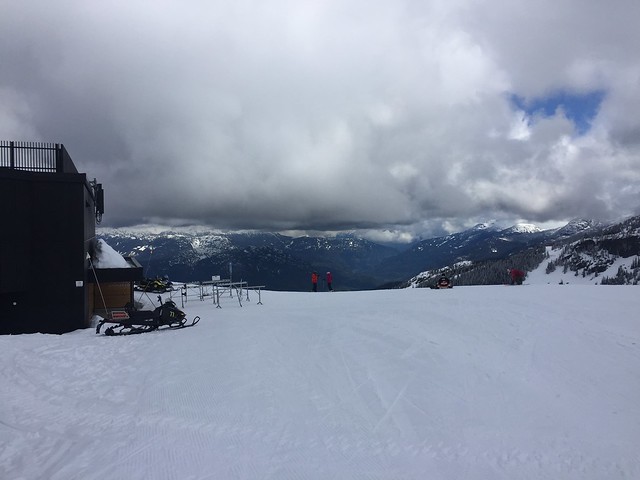 |
| I'm sure it helps if you're a fearless kid and don't suck at skiing. Were these children just born with skis on their feet? |
Why is it that all ski villages look the same worldwide? There are the same three retail brands, a Starbucks, and an ice bar. I felt like I could be in Queenstown, NZ or Lake Placid, NY.
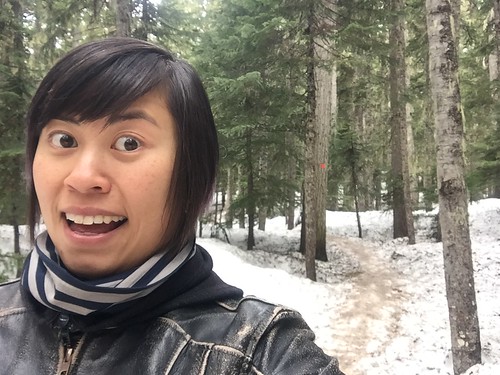 |
| The most dangerous trail I've ever taken, I was slipping and flailing a spastic dance the whole way. Looks like I got some skiing in after all. |
It was serene to sit at the edge of this half-frozen lake. At least, it was until a gaggle of teenagers showed up. Their behavior was stark contrast to the quiet cold of the woods, and made me wonder if I was ever that annoying in pupa stage. Cue my departure, damn kids!
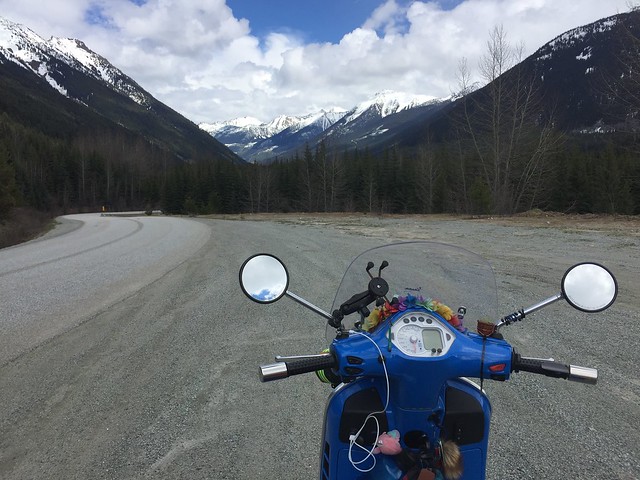 |
| Back on the scoot. The Sea to Sky Highway is up there with riding through Glacier National Park. Absolutely dwarfed by mountains. |
I didn't realize I was approaching Lillooet until I had already blown by the welcome sign. It read, "Lillooet, Guaranteed Rugged," in all caps, printed in a font a steakhouse may find favorable. The road descended steeply into a valley town, hemmed in on all sides by steep mountain faces. They were violet in shade but the peaks were shallower and rounded, the pale blue snow had all but disappeared from their tops. I'd entered the 'inland desert' that Rob and Pamela had described – the end of the scenic road.
 |
| Thanks to the Internet, I found a photo of the steakhouse. |
"Lillooet. Rugged. Chewy. Seared on the outside, bloody on the inside. Eat it with an ax, if you're a wimp," I'm hereby expanding on the name in my memory.
A number of other motorcyclists were buzzing around the gas station ("Alaska? Where's your fishing rod?"), or taking photos by the Mile 0 marker for Old Cariboo road, the beginning of the road for miners in gold rush days. It struck me as a pretty sounding name for a town guaranteed to be rugged, but it turned out it was originally named Cayoosh Flats. The locals found it unsavory, so it was renamed for the Lillooet Trail and the nearby Lil'wat native people.
The road north of Lillooet would have been as dull as Rob had warned me, but the weather kept me on my toes. Alternating sun and showers, hail coming sideways, and temperatures down to 3 C made me glad I brought my heated gloves. My pack was the smallest it had ever been, because I simply wore everything.
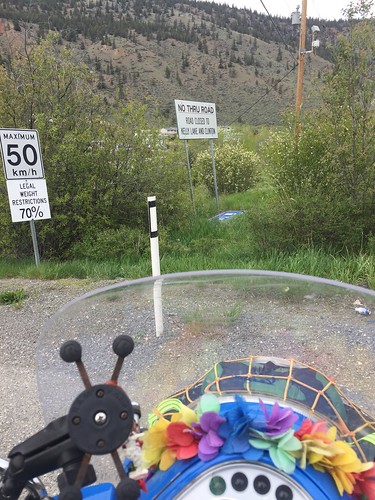 |
| Neil had mentioned a partially paved road from Pavilion to Clinton, but this sign was discouraging. Next time. I have plenty of gravel to look forward to farther north. |
Before I left, Bagel had put me in touch with George at the Rangeland Motel in Lac la Hache, where the Cannonball riders (including Bagel and Neil) stayed in 2014. George himself was a retired scooterist, and just the most chill, laid-back guy.
"Stay as long as you want, check out in whenever, just leave the keys in the room. We don't lock anything," George told me.
He mentioned motorists coming through here on long overland hauls sometimes stayed for weeks to rest. The rooms were small and smelled faintly like grandma was a smoker, but in a cozy, welcoming way – this grandma probably lets kids eat the chocolates with alcohol in them. Lac la Hache was more of a gas station than a town, but it was peaceful and had all the necessities – the foremost for me at the time being warmth and sustenance.
Thankfully, Hungry Bear Two was the kind of diner that feeds truckers: a straightforward menu with good value and massive portions. The TV played softly in the corner, and their tone was so serious I thought surely they must be discussing politics. Upon closer listening, it was followup to a hockey game.
The only other establishment open in town was Red Crow Cafe. Behind a sleepy bar, three kids in their early twenties kept themselves entertained by learning to play pool. They turned out to be on workaways from Europe, and we chatted until two Lac la Hache locals blew in. The young bartender from Holland took their instructions to make a round of Vitamin C drop shots (equal parts Red Bull, orange juice, and vodka dropped in a shot glass). The besties showed off their new matching tattoos, invited everyone to their house party, and took some selfies on my bike on the way out. By the time I called it a night, Rick, the owner of the Red Crow, promised to make me a cheeseless pizza when I'm back through town.
The Rangeland may look modest, but with flannel sheets and a down comforter it was the perfect place to lay my head. A true motel.
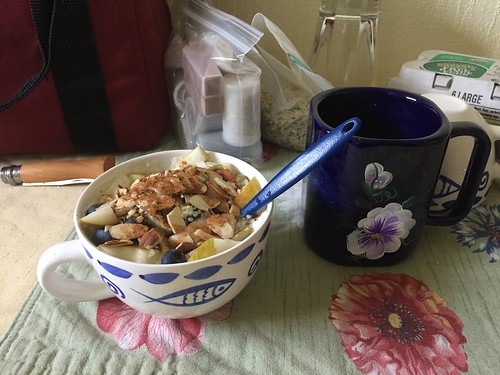 |
| Woohoo, making breakfast in real tableware. That's actually my second cup of coffee, the first I sipped from under the warmth of covers. |
The sun was bright by 5:30am and unbearable by 7, reminding me that nighttime would eventually shrink to a gasp as I pressed north.
The land beyond opened up on a scale altogether too big for a scooter, and I felt like a flea roving across a large green animal's back. I could see weather as I approached it, grey smears on a cerulean sky. The road continued to alternate between shade and bright sunlight, but sometimes it was miles after ducking into shadow before tiny raindrops would make my vision sparkle. A crosswind dogged me, occasionally bouncing hail off my visor. I'd reached to the part of the ride that's merely covering distance.
Neil had warned me against Vanderhoof (I believe 'shithole' was the precise phrase he used) but the distance was about right and I needed a warm place to rest.
The Vanderhoof Inn was a square, shingled building next to the train tracks, and looked a relic from the 70s. It shared the ground floor with a laundromat that was once a "cold beer and wine store," an Indian restaurant, and a townie bar that locked up at 6 (where my scooter was parked, hopefully securely). Most of the smaller businesses looked like they'd been that way for at least 30 years. This was one of the weirder places I'd stayed, but aside from the occasional passing train I did have quiet privacy. The room itself was spacious: an entire efficiency apartment with a full kitchen, plates, mugs, and silverware albeit mismatched. There was even a little packet of shampoo bearing another hotel's name, which made my head smell like orange creamsicle.
Plus, I got to watch a Canadian public TV program about the Oka Crisis. As I drifted to sleep to a 9:30pm sunset it struck me that this would never fly on American television, there seemed to be so little public interest in the stories of First Nations or Native Americans.
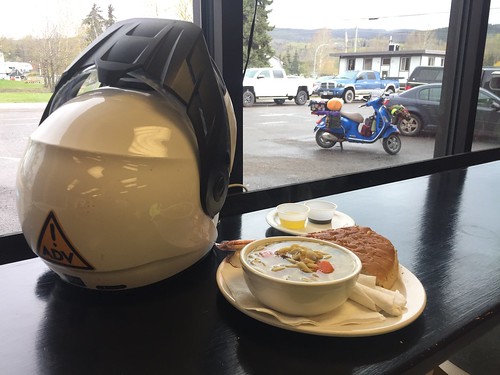 |
| Warming up in a cafe in Houston, just in time for the hail to start again. Guess I'll take a coffee and wait. Brr. |
I had a delicious taste of sunshine for a moment before the skies resumed the rain and hail. Oncoming 18-wheelers were carried forward on plumes of vapor mist. Locals in Smithers warned that the rainfall had flooded Moricetown, and when I arrived it was necessary to navigate several roads turned to rivers and corners turned to pools.
Back in New Westminster, Pamela had put me in touch with her friends, Peggy and Phil in Hazelton, BC. I couldn't be more grateful for their hospitality, as I think Pamela neglected to mention I was passing though and they generously took me in with no idea how long I'd be around.
Over some much appreciated hot tea, Peggy told me about her local charity work (aside from the charity of taking in random scooterists with nothing more than the recommendation of her church outreach friend) and some of the history of the Kispiox and Ksan villages. It was a lot of take in, and a quick time check revealed that the village museum was open for another half hour.
With sun in the sky until 10pm, I went back from a scoot around the tiny town of Hazelton and up to visit Kispiox until Phil arrived for dinner.
There's a long history of paddlewheel steamboats on the Skeena river, especially during gold rush days. The names of towns I'd passed – 70 Mile House, 100 Mile House, 150 Mile House – were all acquired for the distances from Lillooet during the Cariboo Gold Rush. There were so many gold rushes, Lillooet was once the "largest city west of Chicago and north of San Francisco" during the Fraser Gold Rush (1958-59). It also may be the oldest continuously inhabited location on the continent, First Nations people having been settled here since time immemorial.
Anyway, back to Hazelton.
A scoot by the Tri-Town Theatre found they showed one movie at a time, with two screenings on Monday, and Thurs-Sunday. Admission? $6 for 2D, $9 for 3D.
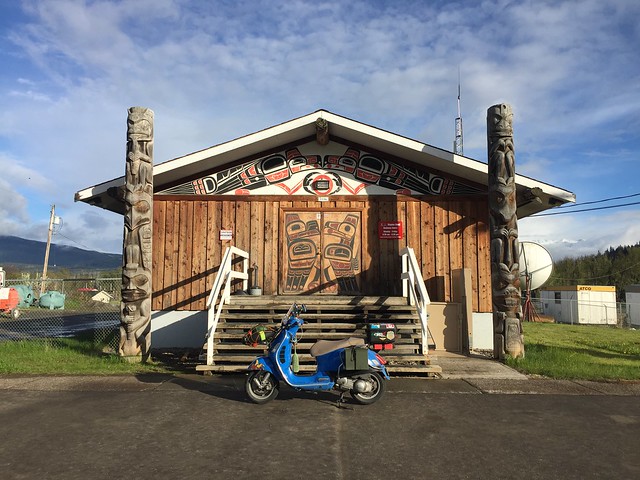 |
| 'Band Council' suggests music to me, but First Nation Bands are collections of chiefs for government. I still think of music. |
I poked around Kispiox and saw other lonely roads to reserves, but I didn’t follow them. I already felt like an intruder in such a small, old community. Maybe it was all the dogs that barked at me or chased me.
I was surprised to find a Chinese restaurant in such a small town, but according to a historical map in town the Sunrise Cafe had always been a Chinese-Canadian restaurant. Upon further research, during the Omineca Gold Rush, about 40% of miners were Chinese, already experienced miners from the Cariboo Gold Rush.
Perhaps the most remarkable thing about meeting Peggy and Phil was discovering Phil's mother's work: Gladys Muir gave birth to Phil, the kind, bushy-eyebrowed retired physician folded into the recliner before me, while on a Mission in southwest China. She wrote a book about her experiences, Yun-nan, South of the Clouds: My life in Southwest China from 1939-51, which Phil was working on re-publishing. Phil not only spoke some Mandarin, but brought out a box of letters, telegrams, and correspondences from his mother's years in rural China. Among them were photos of Phil as a child, seated on the handlebars of a bicycle.
As the sunlight slid into steep angles across their livingroom I sat transfixed, listening to his stories of his mother's life – everything from a traditional welcoming ceremony for her first-born son (Phil), to the harshness and violence of regime change in 1949, to their family fleeing China when religion was no longer welcome. When words ran out, I absorbed Gladys' book, and pored over the artifacts in the box.
It was amazing to witness such a collection of first-hand accounts from a remote part of China, a place far beyond even the faintest dream of tourism, and at a volatile and pivotal time in Chinese history. Perhaps Western eyes would never have such a rich picture of it without the efforts of Missionaries, who took the time to learn a language and document what others would consider trivial. All these photos, notes, and reports of local customs, daily life, and traditions possibly would have been lost in time, or to the brutality of Japanese occupation and viciousness of change to Communism. I had a new sense of the drive their family must have had to stay in such a difficult place, trying to affect change, and why it's called a 'mission'.
Yet alongside the first-person descriptions were quips for how many Chinese had converted each day, or how many expressed an interest in converting. It was jarring to me, and I couldn't put my finger on what made me uncomfortable about it. While I cannot deny the charitable effects of Missions, I wondered if people at the time felt this was a fair exchange of culture. Faith is generally a positive force, but religion has a much darker history.
I could see first hand the positive effects individuals like Peggy and Phil had on their community, including their commitment to learning and sharing the history of their home. I'm just glad not to have to reconcile with a belief system, or y'know, be a Chinese peasant during regime change.
Personally, I'm much more in the camp of, "The existence of the Emoji Movie alone is proof there is no god."
For a single overnight, it was an extremely enriching stay. I never would have explored this town if not for Pamela, Peggy, and Phil. Like many of the other quiet towns and small communities, I would probably have blown though. You can’t see them all, but I'm grateful they took the time to share a little slice of their life here.
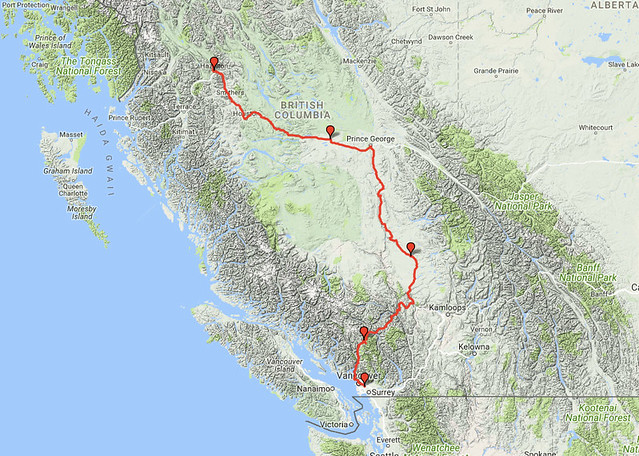
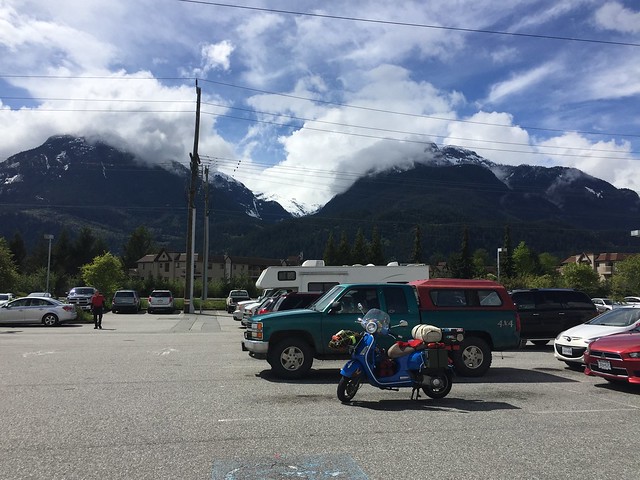
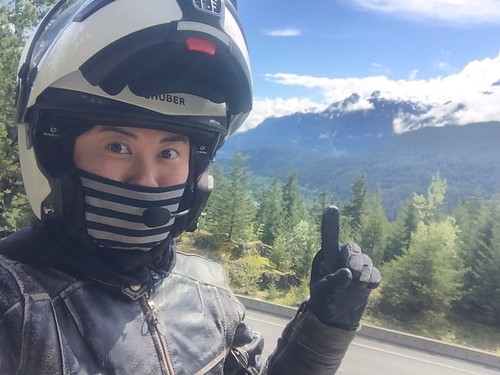
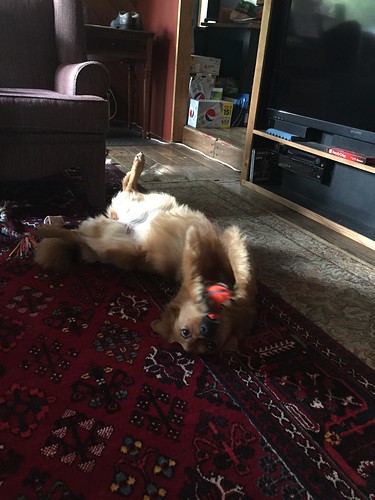
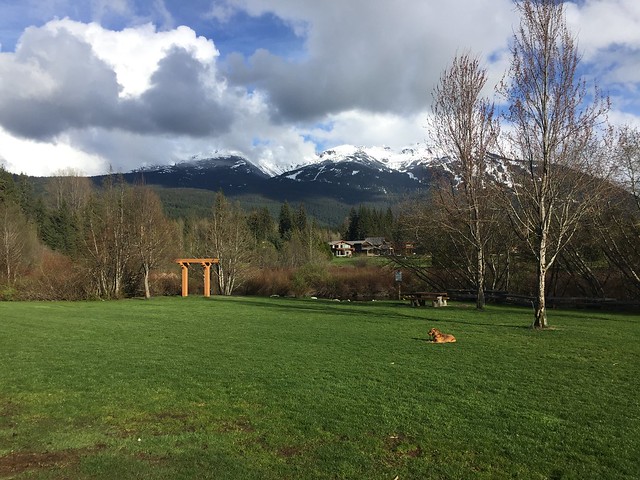
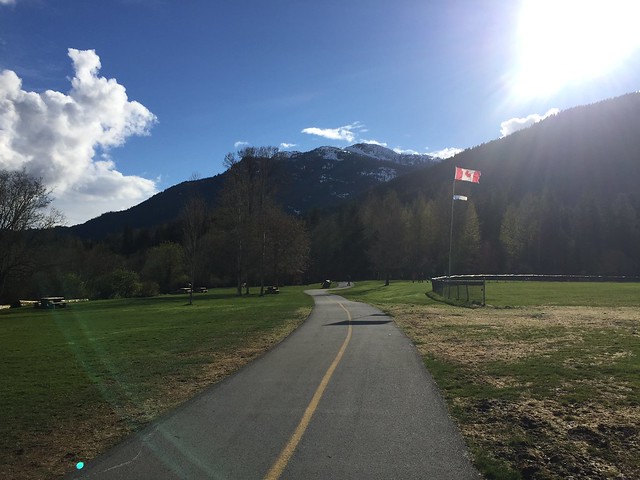
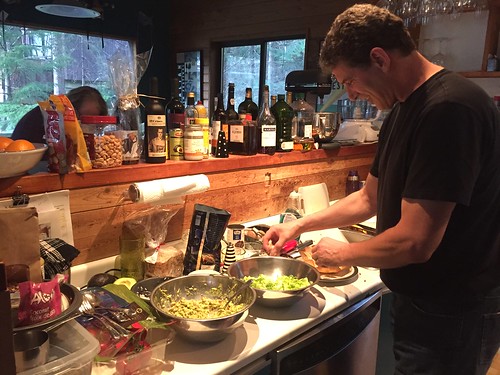
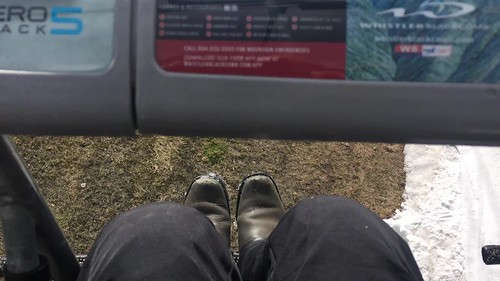
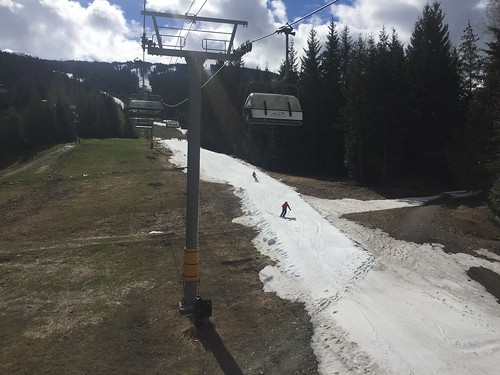
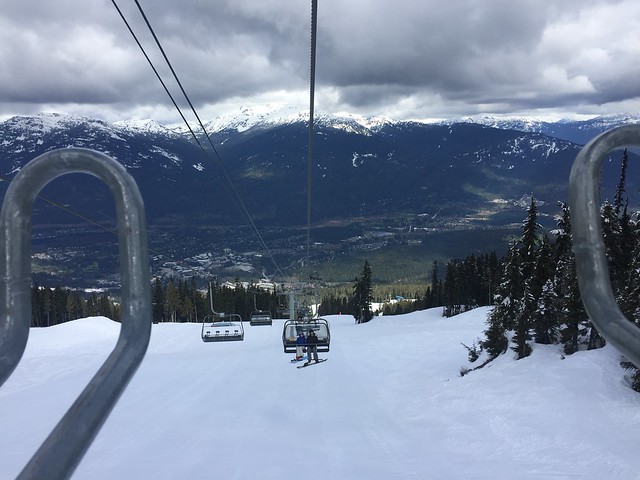
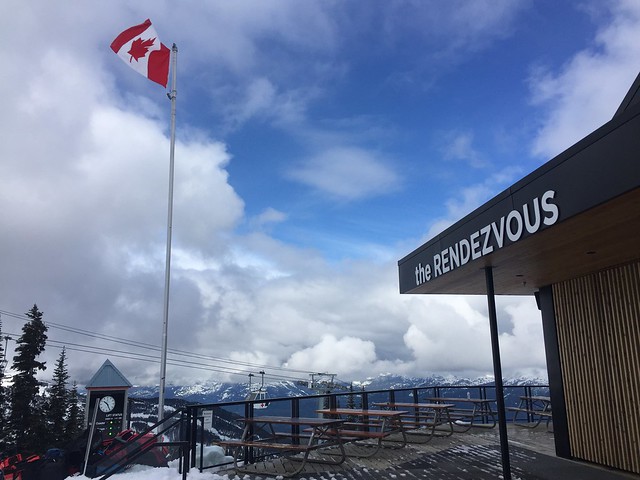
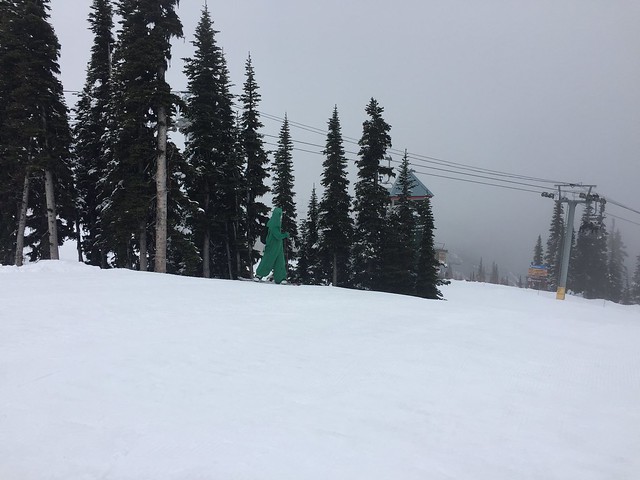
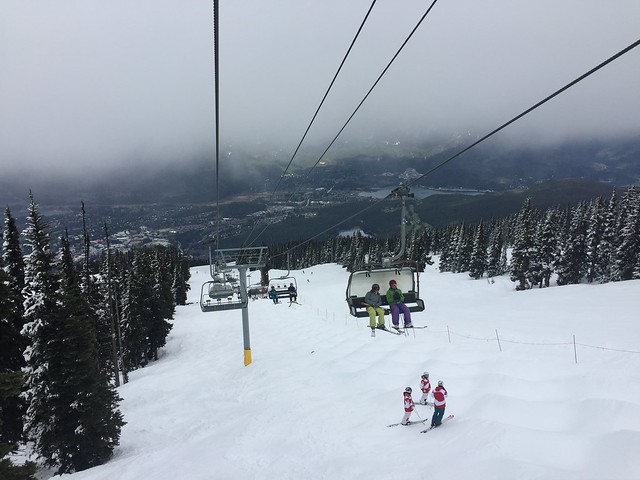
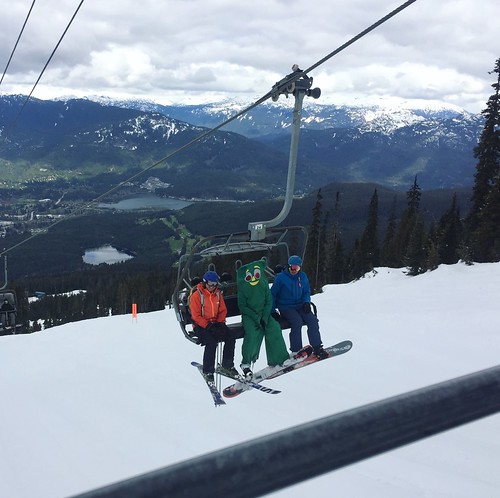
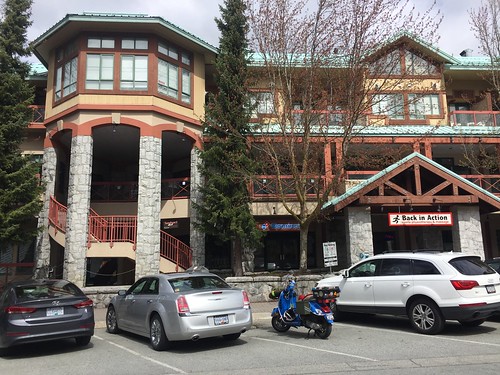
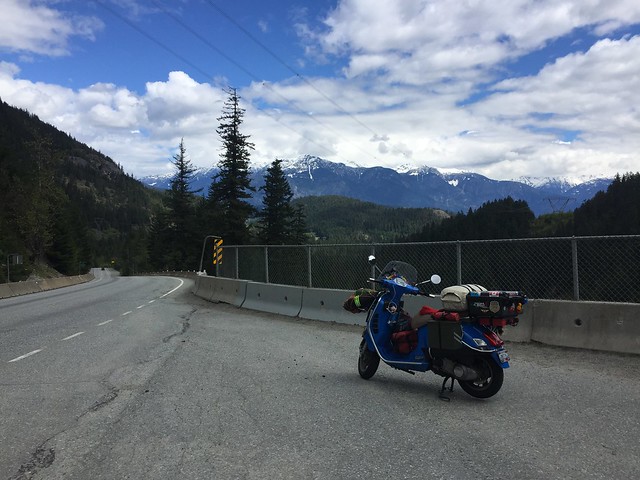
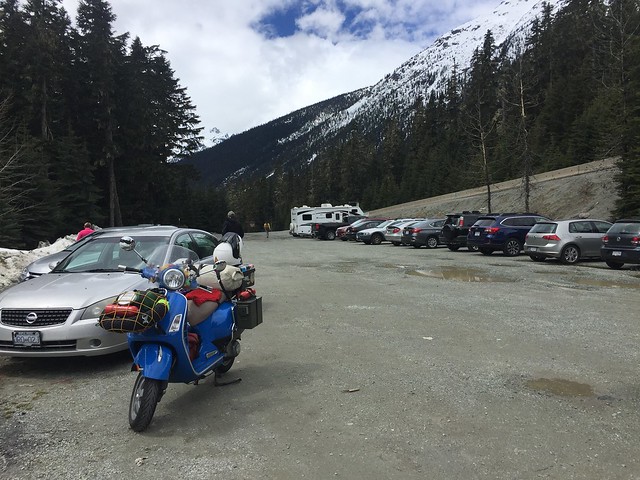
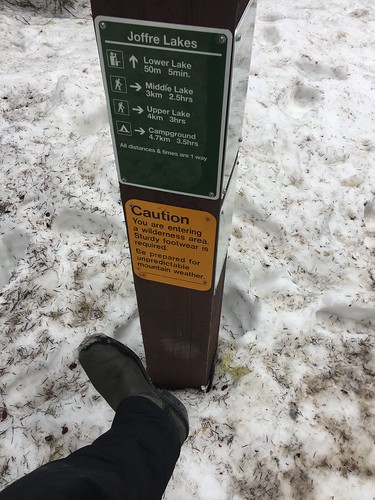
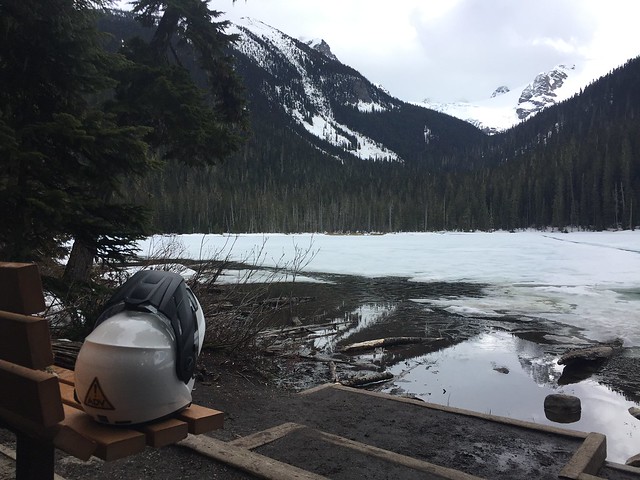

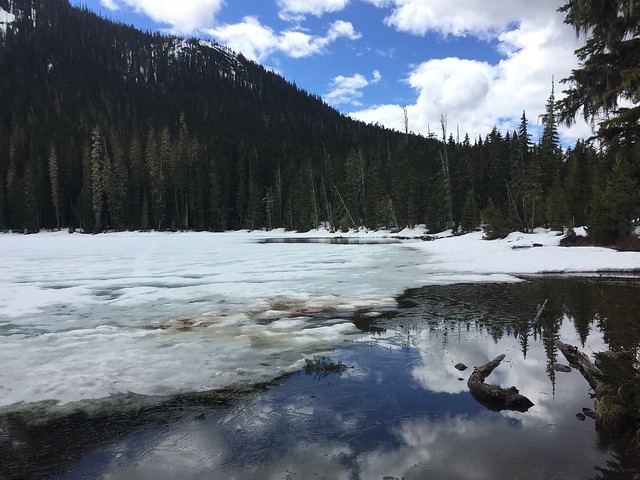
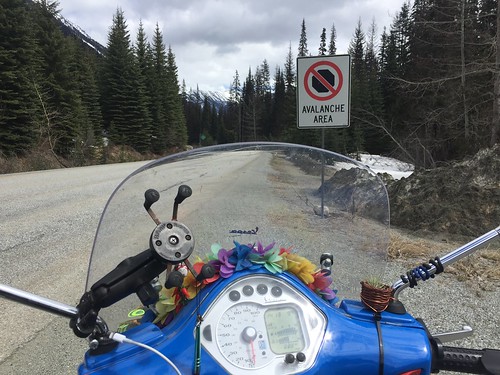

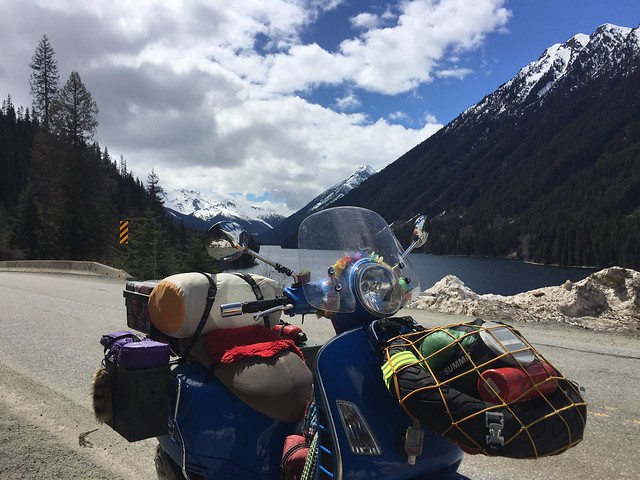
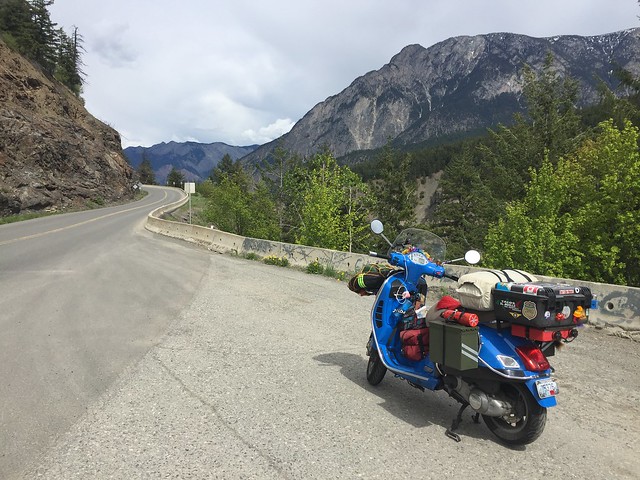
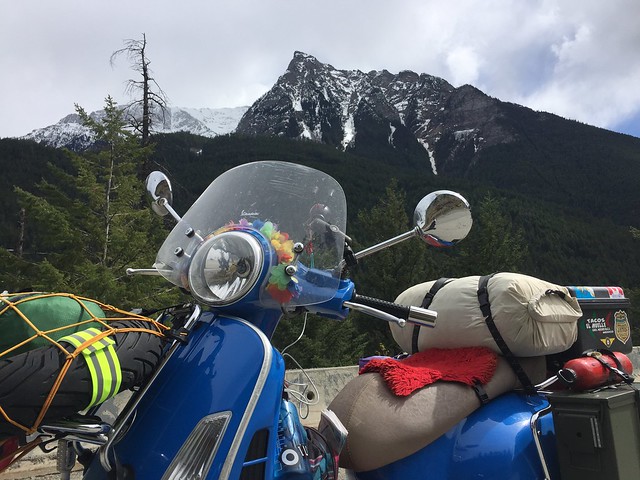
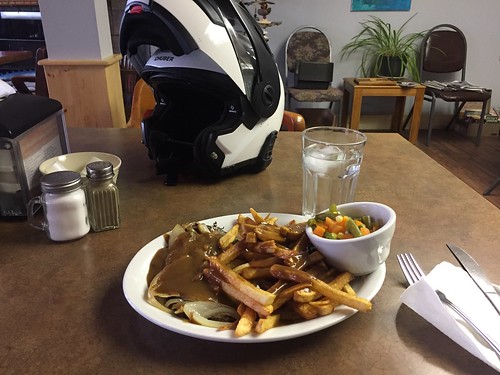
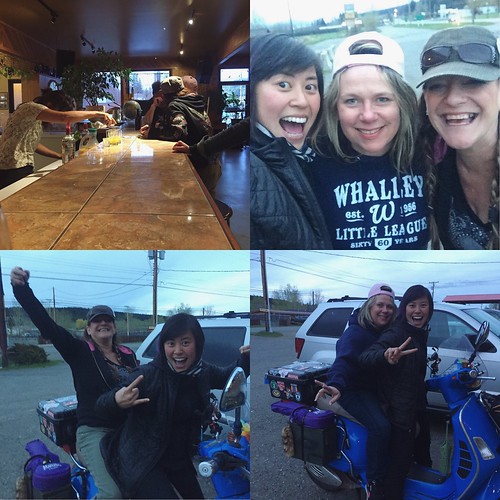
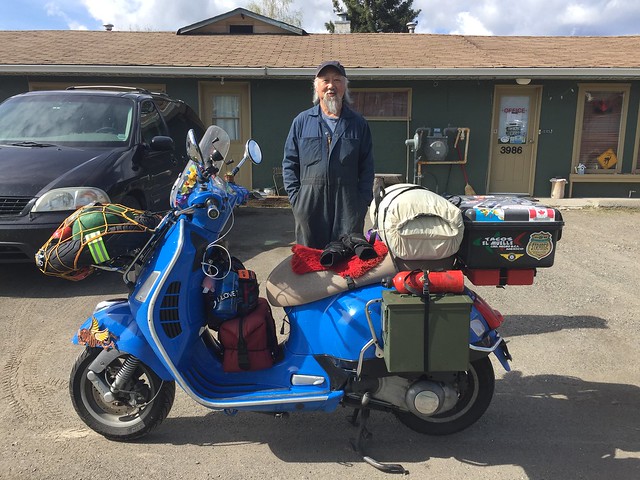
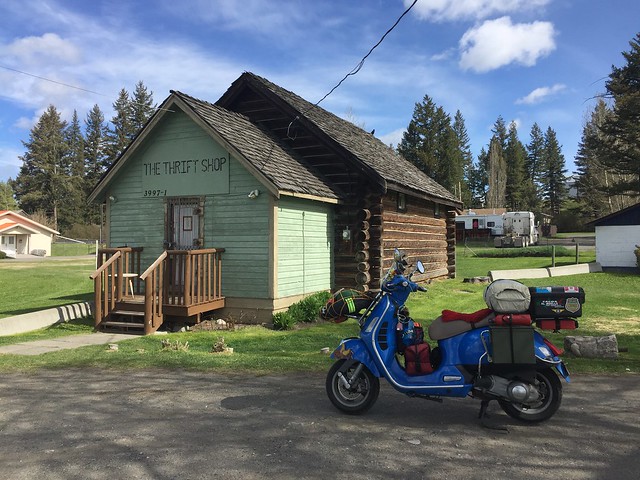
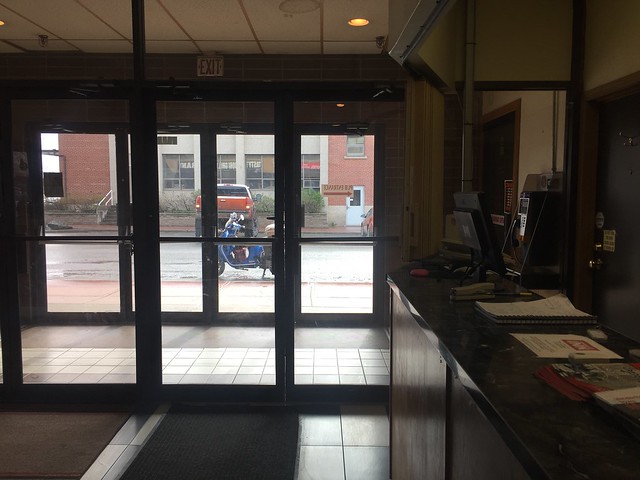
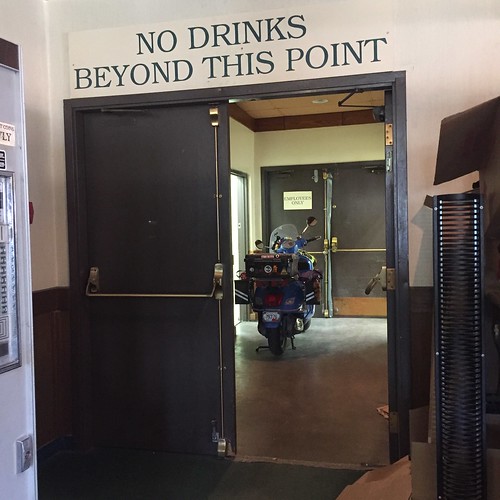
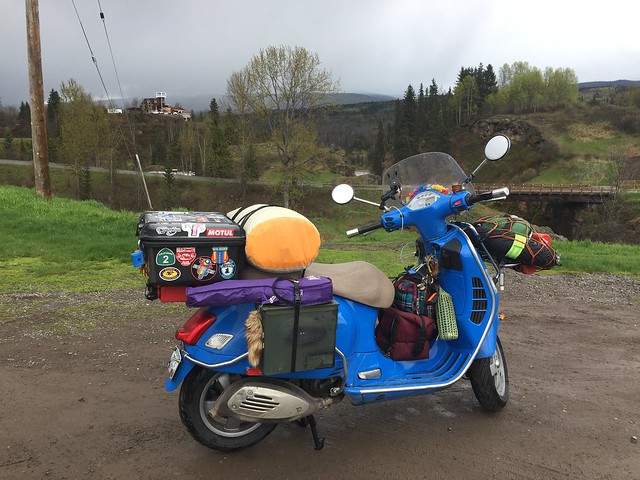
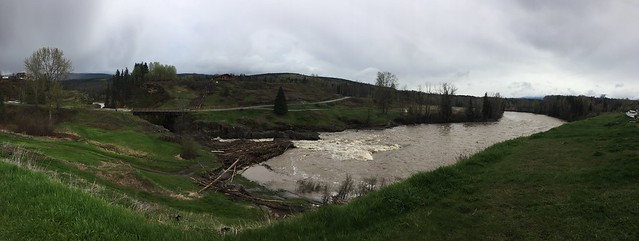
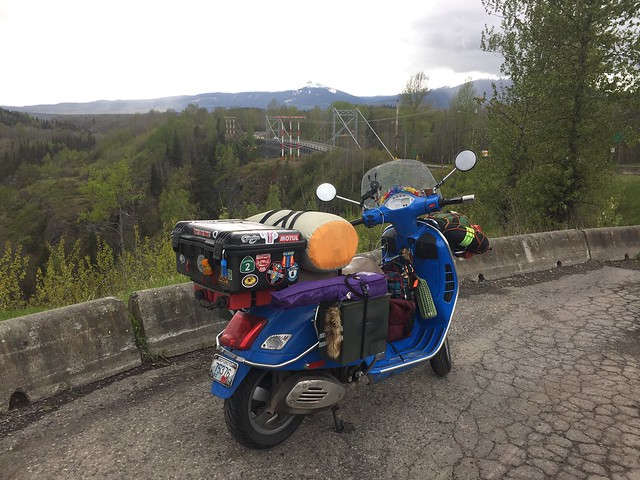
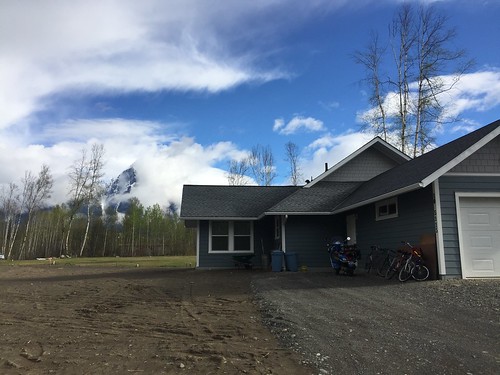
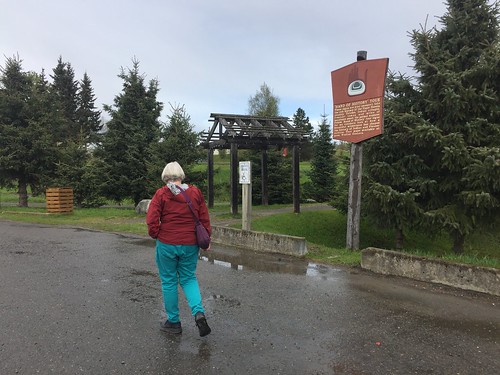
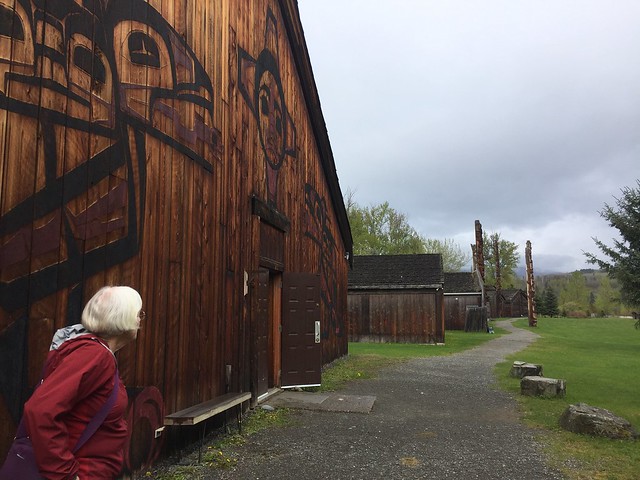
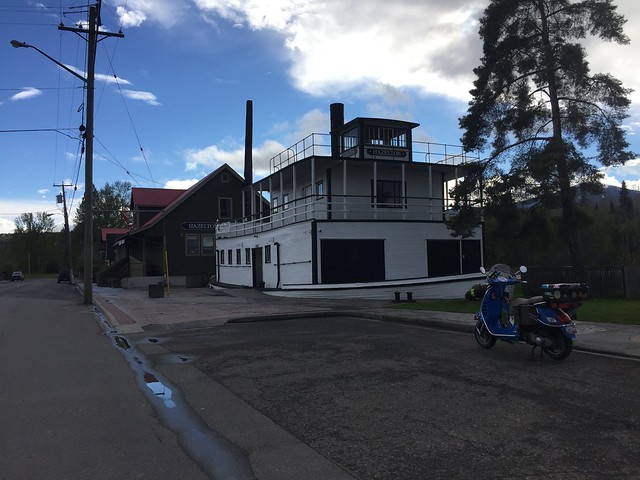
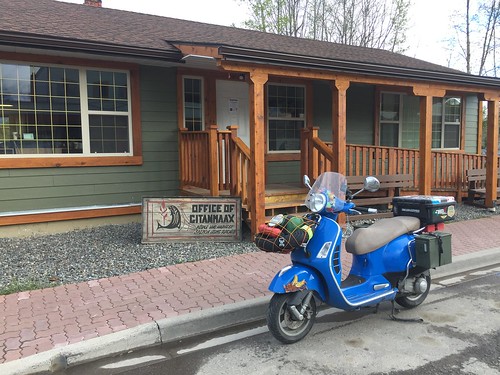
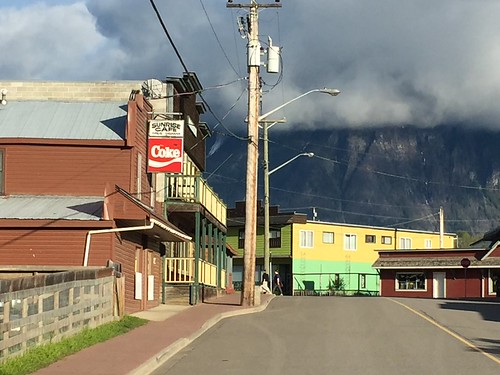
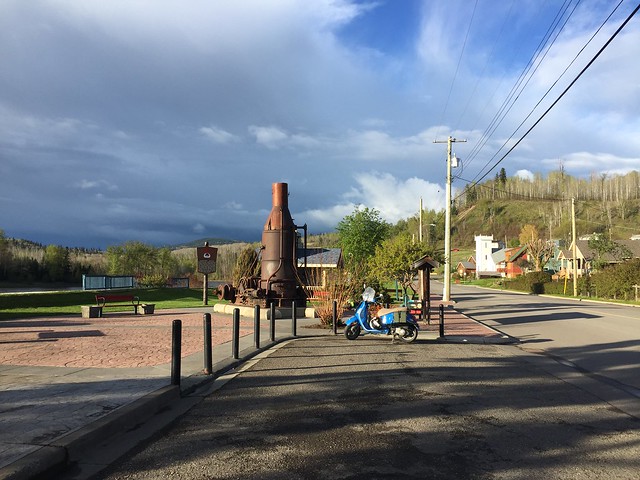
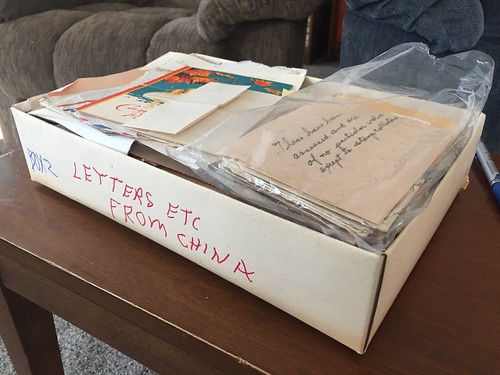
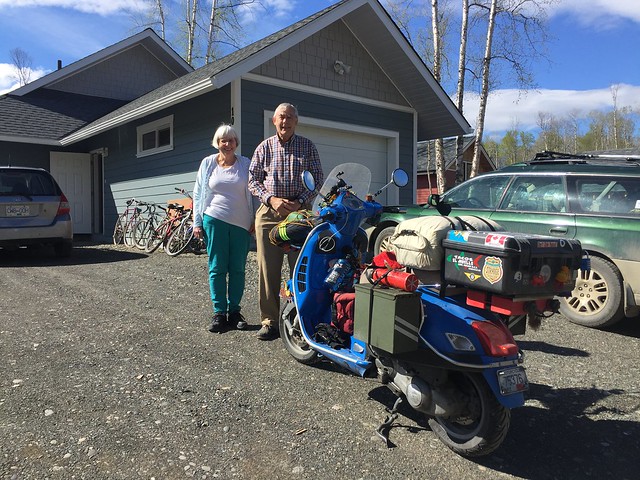
What an amazing trip, and so well documented! I finally have the time to sit down and catch up on your trip. I am reading your blog on one screen, and Google Maps open on another screen, following along! Thank you for sharing this!!
ReplyDelete